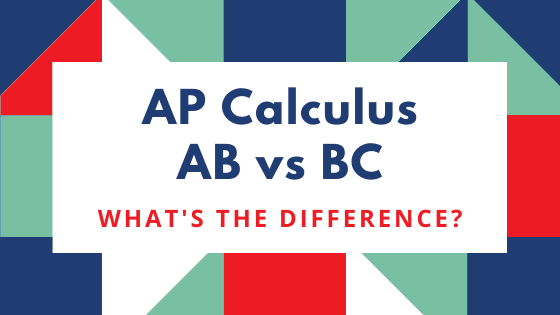What are AP Calculus AB and AP Calculus BC?
AP Calculus AB and AP Calculus BC are the two advanced placement calculus exams offered by the College Board. Both serve as an introduction to calculus with
- AP Calculus AB covering the material of a typical first semester/quarter college calculus course
- AP Calculus BC covering material from the first two semesters/quarters of a typical college calculus sequence
Key Differences:
The AP Calculus exams are unique because AP Calculus BC covers all the material from AP Calculus AB. In fact, students who take the AP Calculus BC exam receive a Calculus AB Subscore which rates their performance on the Calculus AB topics.
The main topics of limits, derivatives, integrals, and differential equations are covered in both Calculus AB and BC. Certain concepts in integration (integration by parts, partial fractions, and improper integrals) and differential equations (Euler’s method for approximation and logistic models) are only covered in BC.
The biggest difference is that BC includes two additional major topics. Note these two topics make up approximately 30% of the BC exam!
- Derivatives and Integrals with parametric equations, polar equations, as well as vector functions. Applications covered in AB such as areas, arc lengths, etc. are all extended to these additional types of equations.
- Infinite sequences and series. Methods for determining convergence or divergence of sequences and series plus functions as power series (such as Taylor or Maclaurin series).
Which course and exam should you take?
There are three different ways of approaching AP Calculus.
Advanced math students can take Calculus BC (without taking Calculus AB). AP Calculus BC is very difficult, so students skipping AB should be confident in their abilities and have dedicated time for studying calculus. However, for talented students this is probably the best option. Even if they struggle with the BC topics, the AB subscore on the exam can ensure they receive college credit for the AB portion of the course.
Students can choose to take Calculus BC after first taking Calculus AB. (This is the standard pathway for many school districts.) This ensures that when students take Calculus BC they have already been exposed to the main concepts and can focus on the more difficult concepts to ensure they get a 5 on the AP exam. Options such as online or summer learning can allow students to take Calculus AB and get ahead without disrupting their school schedule.
In fact, most students in high school who take AP Calculus just take the AB exam. AP Calculus AB is still a challenge for many students, and might be the best option for students getting ready for college. For students not pursuing math, science, or engineering, a passing score on the AB exam often fulfills any math requirements in college.
How to Prepare:
Students preparing for an AP exam should take an accompanying AP course to prepare for the exam.
- AP Courses at your school: Many schools offer AP courses during the school year and these are a great way to take AP courses prepare for the exam.
- AP Courses outside your school: Fitting AP courses into a high school schedule can be difficult! Many schools have restrictions on how many AP courses a student can take or have a lot of prerequisites before a student can take an AP course.
Areteem offers online AP courses, both in the summer and during the school year. Click here for more information about upcoming offerings!
In addition to a full course, many options for review are available before the exam each Spring:
- College Board: The College Board website features official descriptions for AP Calculus AB and BC, plus released exam questions from previous years (AB Free Response Archive, BC Free Response Archive).
- Khan Academy: Khan Academy offers free review content for students preparing for the AP exam (Calculus AB Review, Calculus BC Review).
- Areteem 8 Week Review Courses: With so many resources available, it’s hard to know how to best prepare. Areteem offers personalized final review with small class sizes to helps ensure your 5 on the AP exam.
